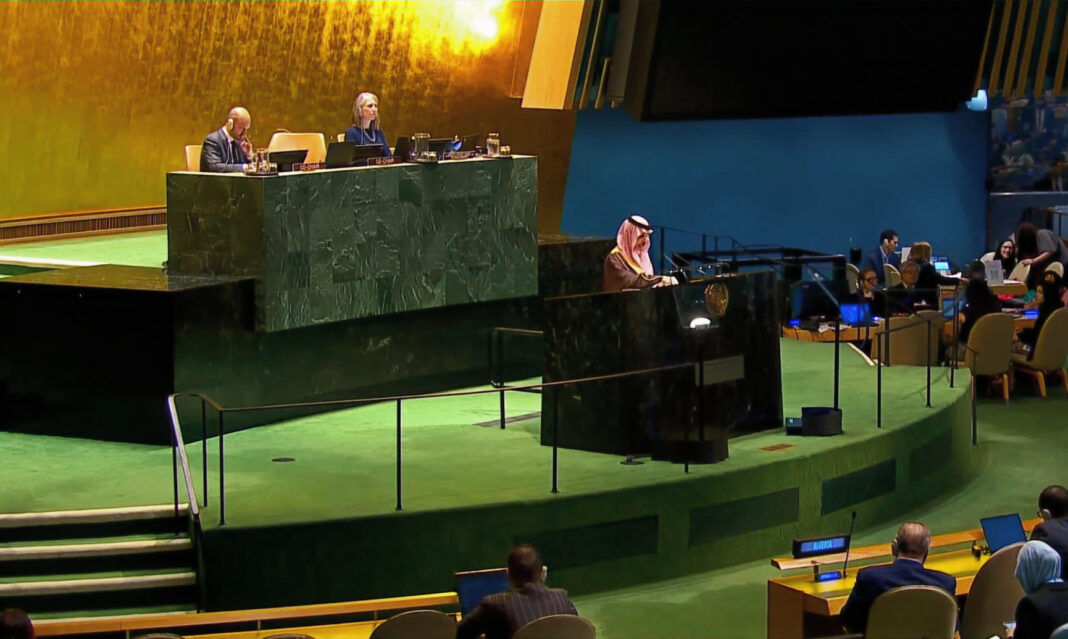By Ahmed Fathi
UNHQ, New York (INPS Japan/ATN) – The high-level UN Conference on the Two-State Solution, co-chaired by France and Saudi Arabia, began with familiar rhetoric and cautious expectations. But by its close, it had produced something rare in modern diplomacy: a visible, collective shift in global posture toward the long-delayed recognition of the State of Palestine. And critically, the shift is no longer driven by the Global South—it’s being led, for the first time, by members of the G7.
A Diplomatic Domino Effect

It began with France, whose President Emmanuel Macron announced on July 24 that Paris will formally recognize the State of Palestine during the 80th session of the UN General Assembly in September. Five days later, UK Foreign Secretary David Lammy, invoking the historical burden of the Balfour Declaration, declared that Britain will do the same—unless Israel ends its military campaign in Gaza and recommits to a genuine two-state framework. His remarks carried weight and clarity: “The Netanyahu government’s rejection of a two-state solution is wrong—morally and strategically.”
And then, on July 30, Canada’s Prime Minister Mark Carney joined the movement, pledging recognition in September—conditional on internal Palestinian Authority (PA) reforms and credible plans for 2026 elections excluding Hamas.
Within one week, three G7 nations—France, the UK, and Canada—broke with decades of Western diplomatic ambiguity. That’s nearly half of the bloc moving toward unilateral recognition, with Portugal now also announcing its intent to follow suit.
Cracks in the Wall: Israel’s Growing Isolation
Perhaps the most striking development is that these recognitions are not being led by ideological adversaries of Israel, but by historic allies. And more importantly, they’re being catalyzed by disillusionment with Israel’s current leadership.
Nowhere is this clearer than in Europe. The Netherlands, long a stalwart partner of Israel, has for the first time designated Israel as a national security risk due to its far-right leadership and humanitarian violations in Gaza. Dutch authorities have even introduced targeted sanctions and travel bans on Itamar Ben-Gvir, Israel’s National Security Minister, and Bezalel Smotrich, the Finance Minister. EU-wide proposals for broader sanctions are under debate.
This isn’t just reputational damage—it’s institutional isolation, even within traditionally protective multilateral frameworks like the European Union and NATO. With France, Ireland, Spain, Norway, and now Portugal leading a recognition cascade, and Germany and Belgium under pressure to follow, Israel faces an unprecedented erosion of Western support.
A Conference That Delivered—But Not As Expected
The conference, convened under UNGA Resolution 79/81, unfolded in classic UN fashion—plenary sessions, impassioned speeches, photo ops. But it produced three game-changing effects:
- Political Alignment Among Major Western States
What began as symbolic diplomacy quickly transformed into policy commitments by France, the UK, and Canada. Their announcements didn’t just endorse a two-state vision—they set deadlines. - Moral Clarity from The Elders
At a parallel press briefing hosted by the United Nations Correspondents Association (UNCA), Mary Robinson, Juan Manuel Santos, and Zeid Ra’ad Al-Hussein confronted the Gaza crisis head-on. Robinson accused Israel’s government of “committing genocide,” citing B’Tselem and Physicians for Human Rights–Israel. Santos warned that eliminating Hamas as a concept is a “strategic delusion.” Zeid emphasized that the two-state vision is no longer theory—it’s “an expression of justice and humanity.” - Arab World Consensus on Hamas Disarmament For the first time, Saudi Arabia, Qatar, and Egypt jointly called for Hamas to disarm and step aside from governance in Gaza—a coordinated message previously avoided due to regional divisions. This adds weight to the argument that recognition of Palestine must also include governance reform, not just anti-occupation rhetoric.
What the G7 Can (and Can’t) Achieve
This collective momentum by G7 members carries enormous potential:
- Diplomatic Leverage: Recognition alters the playing field. It internationalizes Palestine’s status and pressures Israel to re-enter negotiations.
- UN Voting Dynamics: More G7 votes for Palestine could reshape Security Council debates, intensify pressure on the U.S. veto, and amplify Global South demands.
- Legal Grounds: Palestine gains stronger legal standing at the International Criminal Court (ICC) and International Court of Justice (ICJ)—and could pursue cases tied to occupation, war crimes, and apartheid.
- Financial Ramifications: EU sanctions, trade freezes, and Israeli debt downgrades are now within reach.
But recognition is not a silver bullet. It won’t end the occupation, nor will it magically rebuild Gaza or unify a fragmented Palestinian polity. What it does do is shift the diplomatic consensus—and in a space where consensus is power, that shift is seismic.
America, Trump, and the Contrarian Stance
With Donald J. Trump back in the White House as the 47th President of the United States, the U.S. now stands virtually alone among G7 powers in opposing Palestinian recognition. President Trump has vigorously defended Israel, opposed all ICC inquiries, and dismissed the conference as “another UN circus that rewards terrorists and punishes allies.”
His administration has cut funding to UN agencies including UNRWA, blocked consensus at the Security Council, and reaffirmed unconditional military and diplomatic support for the Netanyahu government.
But this contrarian stance is growing increasingly politically isolated, even among America’s closest allies. What was once Washington’s unified Western front is now fracturing into divergent paths: one pursuing accountability and statehood, the other doubling down on impunity and stagnation.
Final Thought: Credibility Has a Shelf Life
The message from this past week is clear: Israel’s credibility among Western democracies is eroding rapidly, not because of anti-Israel sentiment—but because of Israel’s own policies under its current far-right leadership.
And while Washington still shields Israel at the UN, the moral consensus is shifting. The two-state solution is no longer just a talking point—it is becoming a defining test of international integrity.
Recognition of Palestine by G7 members doesn’t end the conflict. But it does signal that the era of rhetorical two-state lip service—with no consequences for endless occupation—is drawing to a close.
And for the first time in decades, it’s not just the Global South calling for justice.
It’s London. It’s Paris. It’s Ottawa.
Washington may still resist—but history, it seems, is moving without it.
INPS Japan


